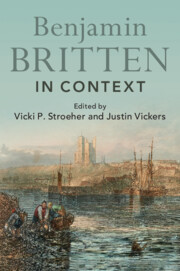Book contents
- Benjamin Britten in Context
- Composers in Context
- Benjamin Britten in Context
- Copyright page
- Dedication
- Contents
- Figures
- Tables
- Notes on Contributors
- Acknowledgements
- Bibliographic and In-Text Abbreviations
- Prologue
- Part I The Britten Circle(s)
- Part II British Musical Life
- Chapter 7 Composing in England
- Chapter 8 Britten and Film
- Chapter 9 Britten and the Radio
- Chapter 10 Recording a Musical Experience: Britten’s Works on Record and Television
- Chapter 11 Music Critics and the Press
- Chapter 12 Britten and English Opera
- Chapter 13 Festival Culture in the British Isles
- Chapter 14 Concert Life in Britain
- Chapter 15 Benjamin Britten and Folk Song
- Chapter 16 Educating the Nation
- Part III Britten and Other Composers
- Part IV Wordsmiths, Designers, and Performers
- Part V British Sociocultural, Religious, and Political Life
- Further Reading
- Index
Chapter 15 - Benjamin Britten and Folk Song
from Part II - British Musical Life
Published online by Cambridge University Press: 31 March 2022
- Benjamin Britten in Context
- Composers in Context
- Benjamin Britten in Context
- Copyright page
- Dedication
- Contents
- Figures
- Tables
- Notes on Contributors
- Acknowledgements
- Bibliographic and In-Text Abbreviations
- Prologue
- Part I The Britten Circle(s)
- Part II British Musical Life
- Chapter 7 Composing in England
- Chapter 8 Britten and Film
- Chapter 9 Britten and the Radio
- Chapter 10 Recording a Musical Experience: Britten’s Works on Record and Television
- Chapter 11 Music Critics and the Press
- Chapter 12 Britten and English Opera
- Chapter 13 Festival Culture in the British Isles
- Chapter 14 Concert Life in Britain
- Chapter 15 Benjamin Britten and Folk Song
- Chapter 16 Educating the Nation
- Part III Britten and Other Composers
- Part IV Wordsmiths, Designers, and Performers
- Part V British Sociocultural, Religious, and Political Life
- Further Reading
- Index
Summary
Commentators on Britten tend to view him as unreceptive to folk song; or if mildly sympathetic, as treating it in isolation from the mainstream of the English Folk Revival. While he steered clear of the revivalist ‘hard line’ represented by Ralph Vaughan Williams and Cecil Sharp, he nonetheless engaged creatively with an ‘alternative’ revival embodied by Percy Grainger and the song collectors Frank Kidson and Lucy Broadwood. This chapter considers Britten’s folk-song arrangements and essays to demonstrate his debt to this ‘forgotten’ tradition of folk-song research. His editorial handling of folk song is examined in light of its theories, while his personal links to Violet Alford, E. J. Moeran, Francesca Allinson, William Plomer, and W. H. Auden – figures who expressed similarly capacious views of ‘folk process’ – are discussed. The emerging ‘heritage movement’ of the 1930s and 1940s, whereby English cultural ‘insularity’ became a source of national celebration and artistic focus, is also assessed. These influences suggest an unsuspected role for folk song in Britten’s construction of a cosmopolitan ‘Englishness’ rooted in the local and the particular.
Keywords
- Type
- Chapter
- Information
- Benjamin Britten in Context , pp. 128 - 135Publisher: Cambridge University PressPrint publication year: 2022

